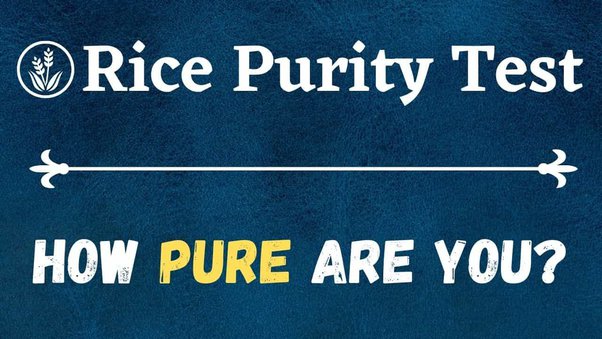Taking the Rice Purity Test has become a popular trend among many young adults, offering a playful way to compare experiences and engage in light-hearted discussions. While it’s not a scientifically rigorous assessment, the test does offer several perceived benefits, particularly in fostering conversations, self-reflection, and understanding societal norms. Here’s an exploration of the benefits of taking the Rice Purity Test, drawing on the observed trends and the impact it has on individuals and social interactions.
1. Initiating Conversations and Bonding
The test often serves as an icebreaker, sparking conversations among friends or groups. By sharing their scores, individuals can find common ground or explore differences in their experiences. This can strengthen friendships, create camaraderie, and encourage open discussions about personal choices in a non-judgmental environment.
2. Self-Reflection and Awareness
Completing the test prompts introspection. Participants reflect on their past experiences, choices, and behaviors. This self-reflection can lead to a better understanding of oneself, values, and personal boundaries. It allows individuals to gauge their comfort levels and determine what experiences are important or meaningful to them.
3. Understanding Societal Norms
The Rice Purity Test questions cover a wide array of activities and behaviors, many of which are influenced by societal norms. Analyzing the test results can provide insights into societal expectations and cultural differences. It helps individuals understand how their experiences align with or diverge from prevalent social norms.
4. Encouraging Safe Behavior
While the test doesn’t aim to promote or discourage specific behaviors, discussing the test results can indirectly encourage conversations about safety and responsible decision-making. For instance, discussions about risky behaviors might prompt individuals to consider the consequences of their actions and make informed choices.
5. Normalization of Diverse Experiences
By showcasing a range of experiences and behaviors, the test promotes the idea that everyone has unique life experiences. It can help destigmatize certain activities by demonstrating that diverse experiences are normal and that judgment based on these experiences is unnecessary.
Data Insights and Trends:
While there’s no conclusive data on the overall impact of taking the Rice Purity Test, its popularity and observed trends suggest certain societal implications:
- Cultural Variances: Scores might vary across cultures due to differing societal norms and attitudes toward certain behaviors. For example, countries with more conservative cultural values might generally yield higher average scores.
- Impact on Peer Interactions: Anecdotal evidence suggests that discussing test results often leads to closer friendships, more open communication, and a sense of camaraderie among peers, creating a shared experience.
- Self-Reflection and Personal Growth: Many individuals report that the test prompts them to reflect on their choices, leading to increased self-awareness and personal growth. It can help individuals reassess their boundaries and make conscious decisions about their behaviors.
- Encouraging Discussions on Responsibility: While not explicit in the test itself, conversations stemming from it often touch upon responsible decision-making, safety, and the importance of respecting personal boundaries.
while the Rice Purity Test is a fun and light-hearted activity, its benefits lie in initiating conversations, fostering self-reflection, and promoting understanding of societal norms. The test serves as a starting point for discussions on personal experiences, societal expectations, and responsible behavior, contributing to personal growth and fostering connections among individuals.
